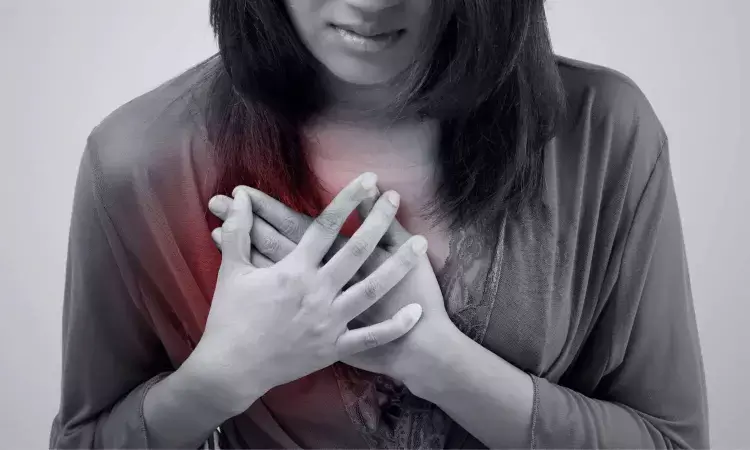- Home
- Medical news & Guidelines
- Anesthesiology
- Cardiology and CTVS
- Critical Care
- Dentistry
- Dermatology
- Diabetes and Endocrinology
- ENT
- Gastroenterology
- Medicine
- Nephrology
- Neurology
- Obstretics-Gynaecology
- Oncology
- Ophthalmology
- Orthopaedics
- Pediatrics-Neonatology
- Psychiatry
- Pulmonology
- Radiology
- Surgery
- Urology
- Laboratory Medicine
- Diet
- Nursing
- Paramedical
- Physiotherapy
- Health news
- Fact Check
- Bone Health Fact Check
- Brain Health Fact Check
- Cancer Related Fact Check
- Child Care Fact Check
- Dental and oral health fact check
- Diabetes and metabolic health fact check
- Diet and Nutrition Fact Check
- Eye and ENT Care Fact Check
- Fitness fact check
- Gut health fact check
- Heart health fact check
- Kidney health fact check
- Medical education fact check
- Men's health fact check
- Respiratory fact check
- Skin and hair care fact check
- Vaccine and Immunization fact check
- Women's health fact check
- AYUSH
- State News
- Andaman and Nicobar Islands
- Andhra Pradesh
- Arunachal Pradesh
- Assam
- Bihar
- Chandigarh
- Chattisgarh
- Dadra and Nagar Haveli
- Daman and Diu
- Delhi
- Goa
- Gujarat
- Haryana
- Himachal Pradesh
- Jammu & Kashmir
- Jharkhand
- Karnataka
- Kerala
- Ladakh
- Lakshadweep
- Madhya Pradesh
- Maharashtra
- Manipur
- Meghalaya
- Mizoram
- Nagaland
- Odisha
- Puducherry
- Punjab
- Rajasthan
- Sikkim
- Tamil Nadu
- Telangana
- Tripura
- Uttar Pradesh
- Uttrakhand
- West Bengal
- Medical Education
- Industry
Treatment with diltiazem helps woman with severe vasospastic angina conceive and deliver- A report

Japan: Initiation of diltiazem therapy led to pregnancy and the successful birth of a child in a woman diagnosed with severe vasospastic angina (VSA), a recent case study published in JACC: Case Reports has shown.
Vasospastic angina can sometimes result in acute myocardial infarction (MI) in pregnant women, potentially endangering mother and child lives. Hirohiko Aikawa, National Cerebral and Cardiovascular Center, Suita, Osaka, Japan, and colleagues described a case of a young woman with suspected vasospastic angina who wished to become pregnant.
Vasospasm provocation testing revealed severe vasospasm and subsequent appropriate management led to successful delivery.
The case concerns a 29-year-old woman who presented with chest pain only at rest. The Holter electrocardiogram revealed ST-segment depression at the time of chest pain onset. A trial use of nitroglycerin sublingual tablets was effective. She was suggested to have vasospastic angina and wished to become pregnant. She had no medical history.
The possible differential diagnoses included coronary embolism, atherosclerotic coronary artery disease, and spontaneous coronary artery dissection.
The case was discussed by cardiologists and obstetricians who decided to perform invasive coronary catheterization and vasospasm provocation testing to determine a definitive diagnosis and perinatal cardiovascular risk and, to administer a calcium-channel blocker (CCB) if the test was positive.
Coronary angiography performed via her distal radial artery revealed no stenosis. Vasospasm provocation testing with acetylcholine administration into the left coronary artery resulted in sub occlusion in the left main trunk (LMT) with chest pain, ST-segment depression in the V4 to V6 leads, and hypotension. An intracoronary infusion of nicorandil and isosorbide mononitrate improved the LMT occlusion, eliminated electrocardiogram changes, and increased blood pressure (BP). She was confirmed to have severe VSA.
200 mg daily Diltiazem was initiated. She successfully conceived after a few weeks. Diltiazem's effectiveness was recognised after the appearance of chest pain shortly after the temporary discontinuation of diltiazem because of hyperemesis gravidarum. Her pregnancy progressed without chest pain after the second trimester, and the fetus developed well.
A labour induction was planned at the 40th gestation week because spontaneous labour did not occur until full term. Epidural analgesia was used at delivery to prevent vasospasm induction caused by hyperventilation or pain stress.
She gave birth to a healthy girl without any anomaly. For postpartum atonic haemorrhage, oxytocin was used instead of methylergonovine. She had no chest pain or electrocardiogram abnormality in the peripartum period.
The patient continued to take diltiazem after delivery and has had no recurrence of angina attacks. The child was growing up without any disabilities. The amount of diltiazem ingested by the infant via breast milk is small and is unlikely to negatively affect breastfed infants.
"It is important to make a definitive VSA diagnosis for women who wish to be pregnant, determine its severity and provide suitable treatment," the researchers wrote.
"Under conditions of adequate prior consultation with the patient, obstetricians, family, and cardiologists, invasive catheterization including provocation test should be performed, and CCB administration should be considered for VSA," they concluded.
Reference:
Aikawa H, Murai K, Aoki-Kamiya C, Yoshimatsu J, Noguchi T. Diagnosis and Management of Vasospastic Angina in a Young Woman Wishing to Become Pregnant. JACC Case Rep. 2023 Dec 6;27:102051. doi: 10.1016/j.jaccas.2023.102051. PMID: 38094717; PMCID: PMC10715958.
Dr Kamal Kant Kohli-MBBS, DTCD- a chest specialist with more than 30 years of practice and a flair for writing clinical articles, Dr Kamal Kant Kohli joined Medical Dialogues as a Chief Editor of Medical News. Besides writing articles, as an editor, he proofreads and verifies all the medical content published on Medical Dialogues including those coming from journals, studies,medical conferences,guidelines etc. Email: drkohli@medicaldialogues.in. Contact no. 011-43720751


